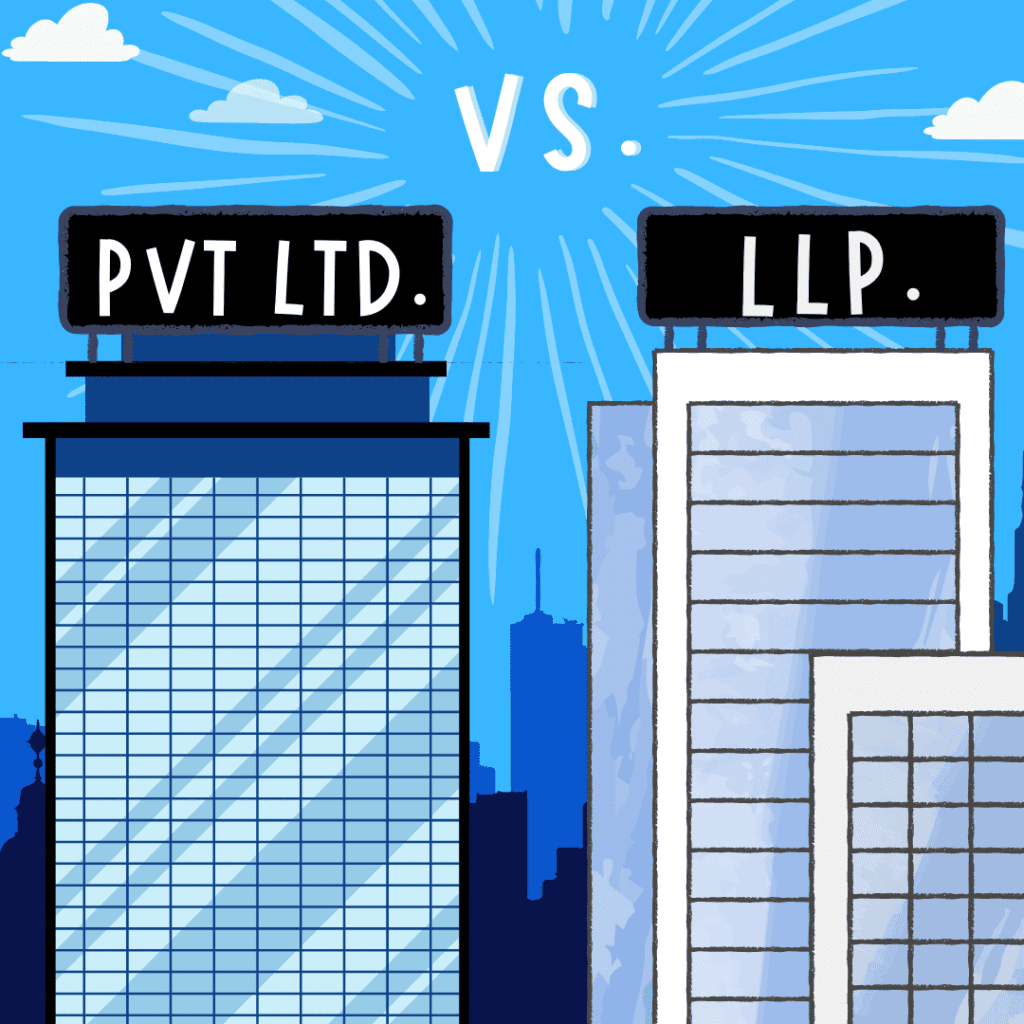Should I form my business as Private Limited Company or LLP?
In this article, we’ll see the advantages & disadvantages of both. Then we’ll compare their major differences.
Your form of business is a really important decision when forming a business as it impacts your ease of business, taxes, investors, and compliance costs.

Summary Answer: Form your business as a...
Private Limited Company (PLC):
If you want to raise outside funding from investors in the near future, avail startup incentives from GOI (such as Tax Exemption, MSME Loans, Priority Tenders, etc.) or want a business that looks more trustworthy to customers.
Limited Liability Partnership (LLP):
If your priority is lower cost, simple compliance and lower income tax on profits.
Private Limited Company
Advantages:
- Limited Liability – Liability of shareholders is limited to the capital invested by them – personal assets of investors are protected.
- Improved credibility as a corporate entity
- Separate Legal Entity – Company is an entity, separate from promoters for all legal purposes. It can hold property and enter into transactions in it’s own name.
- Fund Raising – Companies are the best form of business to raise outside funding from investors, both Indian and Foreign Investors (FDI)
- Preferred by Employees, Suppliers, Customers, Banks and Financial Institutions
Disadvantages:
- Confidentiality – Details of Financials and Promoters are available to the public upon payment of a small fee to MCA. This may not be suitable for people who want to maintain high confidentiality.
- Limit on Members – A Private Limited Company can have a maximum of 200 Members, whereas LLPs and Public Companies can have unlimited members.
Limited Liability Partnership (LLP)
Advantages:
- Limited Liability – Liability of partners is limited to the capital invested by them – personal assets of partners are protected.
- Flexibility – Operation of the LLP and distribution of profits is determined by written agreement between the members. This may allow for greater flexibility in the management of the business.
- Lower Registration & Compliance cost than Companies
- No Tax payable on Dividend to Partners – Effective Tax Rate of LLPs is lower than that of Companies.
- No Limit on number of Partners
- No minimum capital requirement – LLPs can be started with any amount as capital.
- Separate Legal Entity – An LLP is an entity, separate from promoters for all legal purposes. It can hold property and enter into transactions in it’s own name.
Disadvantages:
- Confidentiality – Details of Financials and Partners are available to the public upon payment of a small fee to MCA. This may not be suitable for people who want to maintain high confidentiality.
- Not preferred by investors for Funding – LLPs are not appropriate for external equity funding from Investors (like venture capitalists, angel investors, funds, etc.) and are also not eligible for many startup schemes, so if you’re looking for outside investment in the near future, you should consider forming your business as a company.
Criteria
Private Limited
Company
Limited Liability
Partnership
Customer Perception & Prestige
Better
Good
External Funding
(VCs, IPO, Angel Investors)
Easier
LLP form not preferred by Investors
Foreign Investment
Allowed
Allowed
Government Start-Up Incentives
Easier
Less incentives for LLPs
Cost Of Registration
Higher than LLP
Lower Cost of Formation
Formalities & Annual Compliance
Higher than LLP
Lower Compliance requirements
Annual Statutory Audit
Mandatory for All Companies
Required only if Turnover > 40L or Capital Invested > 25L
Net Tax on Profits
Higher than LLP
30% of Net Profit
Get your business registered in 7 days
with 100% work guarantee.

25+
expert CAs & Lawyers

1K+
companies formed in 2023

100%
money back guarantee